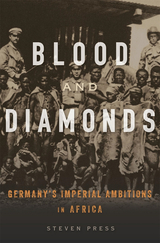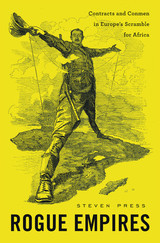
Diamonds have long been bloody. A new history shows how Germany’s ruthless African empire brought diamond rings to retail display cases in America—at the cost of African lives.
Since the late 1990s, activists have campaigned to remove “conflict diamonds” from jewelry shops and department stores. But if the problem of conflict diamonds—gems extracted from war zones—has only recently generated attention, it is not a new one. Nor are conflict diamonds an exception in an otherwise honest industry. The modern diamond business, Steven Press shows, owes its origins to imperial wars and has never escaped its legacy of exploitation.
In Blood and Diamonds, Press traces the interaction of the mass-market diamond and German colonial domination in Africa. Starting in the 1880s, Germans hunted for diamonds in Southwest Africa. In the decades that followed, Germans waged brutal wars to control the territory, culminating in the genocide of the Herero and Nama peoples and the unearthing of vast mineral riches. Press follows the trail of the diamonds from the sands of the Namib Desert to government ministries and corporate boardrooms in Berlin and London and on to the retail counters of New York and Chicago. As Africans working in terrifying conditions extracted unprecedented supplies of diamonds, European cartels maintained the illusion that the stones were scarce, propelling the nascent US market for diamond engagement rings. Convinced by advertisers that diamonds were both valuable and romantically significant, American purchasers unwittingly funded German imperial ambitions into the era of the world wars.
Amid today’s global frenzy of mass consumption, Press’s history offers an unsettling reminder that cheap luxury often depends on an alliance between corporate power and state violence.

In the 1880s, Europeans descended on Africa and grabbed vast swaths of the continent, using documents, not guns, as their weapon of choice. Rogue Empires follows a paper trail of questionable contracts to discover the confidence men whose actions touched off the Scramble for Africa. Many of them were would-be kings who sought to establish their own autonomous empires across the African continent—often at odds with traditional European governments which competed for control.
From 1882 to 1885, independent European businessmen and firms (many of doubtful legitimacy) produced hundreds of deeds purporting to buy political rights from indigenous African leaders whose understanding of these agreements was usually deemed irrelevant. A system of privately governed empires, some spanning hundreds of thousands of square miles, promptly sprang up in the heart of Africa. Steven Press traces the notion of empire by purchase to an unlikely place: the Southeast Asian island of Borneo, where the English adventurer James Brooke bought his own kingdom in the 1840s. Brooke’s example inspired imitators in Africa, as speculators exploited a loophole in international law in order to assert sovereignty and legal ownership of lands which they then plundered for profit.
The success of these experiments in governance attracted notice in European capitals. Press shows how the whole dubious enterprise came to a head at the Berlin Conference of 1884–1885, when King Leopold of Belgium and the German Chancellor Bismarck embraced rogue empires as legal precedents for new colonial agendas in the Congo, Namibia, and Cameroon.
READERS
Browse our collection.
PUBLISHERS
See BiblioVault's publisher services.
STUDENT SERVICES
Files for college accessibility offices.
UChicago Accessibility Resources
home | accessibility | search | about | contact us
BiblioVault ® 2001 - 2024
The University of Chicago Press









